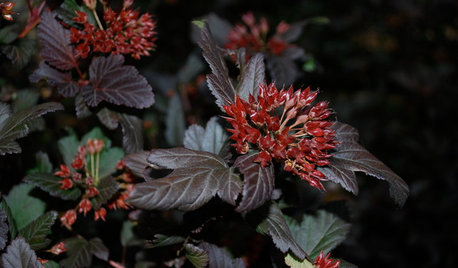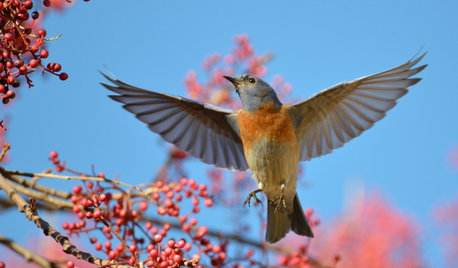Gardening and lyme ticks
KateB22
10 years ago
Related Stories

GARDENING GUIDES5 Unsung Wildflowers That Thrive in Dry Shade
Turn shady problem spots into garden idylls with with these prolific, easy-care bloomers
Full Story
LANDSCAPE DESIGNGreat Design Plant: Sun-Loving Ninebark Puts on a Color Show
This tall, dark and handsome native shrub is equally at home in jeans and boots or in a suit and tie
Full Story
GARDENING GUIDESGreat Design Plant: Velvety Dwarf Bottlebrush Beckons a Touch
Brilliant red blooms and inviting textures will capture your heart, but the low maintenance and small size will win over your practical side
Full Story
LANDSCAPE DESIGNFind Yourself in an Epic Garden in the Shade
Feeling hot and tired gardening in the sun? The world of shade gardening beckons you to its cool mystery
Full Story
EARTH DAY5 Ideas for a More Earth-Friendly Garden
Consider increasing the size of garden beds, filtering rainwater and using plants to reduce energy use
Full Story
GARDENING GUIDESHow to Bring the Joy of Bluebirds to Your Garden
Attract these beautiful songbirds with nesting habitat and food sources, including berry-producing trees and shrubs
Full Story
PLANTING IDEASFerns: A Shade Gardener’s Best Friend
Bring rich texture and contrast to a dark woodland landscape with wonderfully diverse ferns
Full Story
EDIBLE GARDENSSummer Crop: How to Grow Blueberries
Plant blueberries in spring or fall for garden beauty through three seasons — and a sweet superfood in summer
Full Story
MONTHLY HOME CHECKLISTSYour Fall Home Maintenance Checklist
Prep your house and yard for cold weather with this list of things to do in an hour or over a weekend
Full Story
EDIBLE GARDENSHow to Grow Your Own Sweet Summer Crops
This guide will help any gardener get started on growing the freshest warm-season veggies and berries for summer
Full Story







claireplymouth z6b coastal MA
moliep
Related Professionals
Grand Haven Landscape Architects & Landscape Designers · Middle Island Landscape Architects & Landscape Designers · Zion Landscape Architects & Landscape Designers · Wilmington Landscape Contractors · Belvedere Park Landscape Contractors · East Patchogue Landscape Contractors · Gainesville Landscape Contractors · Washington Landscape Contractors · Palos Heights Landscape Contractors · Blue Springs Decks, Patios & Outdoor Enclosures · Lafayette Decks, Patios & Outdoor Enclosures · Lebanon Decks, Patios & Outdoor Enclosures · Parlier Decks, Patios & Outdoor Enclosures · Salisbury Decks, Patios & Outdoor Enclosures · Sugar Land Decks, Patios & Outdoor Enclosuresdiggingthedirt
spedigrees z4VT
diggerdee zone 6 CT
spedigrees z4VT
Thyme2dig NH Zone 5
KateB22Original Author
KateB22Original Author
KateB22Original Author
KateB22Original Author
Lalala (zone 6b)
gardenweed_z6a
NHBabs z4b-5a NH
KateB22Original Author
rockman50
diggingthedirt
moliep
susanzone5 (NY)
terrene
KateB22Original Author